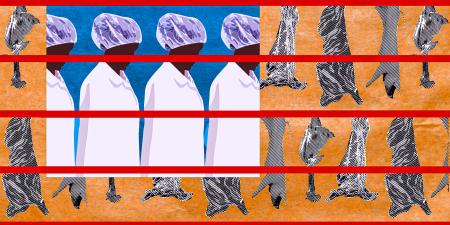Abstract
This commentary on a case considers when physicians offering health advice on diet has potential to undermine trust. If physicians fail to model behaviors for which they advocate, they could be targeted by media or have disputes with colleagues, which could further undermine trust. To better manage professional obligations to both individual patients and the public, this article proposes prioritizing interprofessional, community-engaged approaches to advocacy.
Case
At an American Academy of Family Physicians (AAFP) conference, Dr M learned about the AAFP’s environmental health initiatives and attended a presentation about meat’s contributions to pollution, greenhouse gas emissions, and climate change and the importance of physicians’ clinical and public health roles in counseling patients to reduce industrial meat production and consumption.
One of Dr M’s patients is JT, who washes dishes in a local restaurant known for its “cheap and delicious” barbeque. JT eats there regularly since a meal is free with each shift. Dr M, who eats animal protein only when it’s locally sourced and organic, wonders about the nature and scope of their responsibility as a health professional to promote environmental health patient education through dietary counseling to JT, whose cardiovascular risk is currently low.
Commentary
Calls for physicians to act as health advocates—as individuals or as part of an organization—are ubiquitous in professional guidance and literature.1,2,3,4 As the present case notes, while physicians have traditionally been expected to advocate for their patients, they are increasingly tasked with broader social responsibilities. The American Medical Association (AMA) has declared that physicians have a duty to “educate the public and polity about present and future threats to the health of humanity.”1 Physicians’ advice on health that encompasses individual and public health has the potential to be conflicting, although physicians’ advocacy in the public interest cannot supersede their guidance and care of each individual patient. In this commentary, we point to the importance of promoting physician advocacy in a manner that maintains the sanctity of individual care and relationships.
Counseling patients with low income, such as JT, to make dietary changes—primarily to protect the environment—raises a range of issues: (1) whether people have different degrees of responsibility to support public interests based on their personal circumstances, (2) how the personal responsibilities of physicians are affected by their giving general health advice to the public, and (3) how physicians’ awareness of the wider culture of advocacy and mobilizing a wide range of expertise can support their efforts to advocate for complex public and private issues. Before addressing these topics, we will examine the importance of ensuring that advocacy on social issues does not undermine the trust that people place in physicians.
Advocacy and Trust
Physician advocacy seeks to capitalize on the trust that individual patients place in their doctor to support the medical profession’s efforts to address health challenges that extend from the clinic to society. This rationale depends, in part, on research showing that physicians’ competence significantly contributes to their being seen as trustworthy.5 But it is important to recall that patients’ trust is also based on their believing that their particular or best interests are at the heart of physician practice.6,7 It is a matter of concern that physicians may engage in public health or social advocacy by offering general health advice without considering the specific challenges that individuals might encounter in following that guidance. Such advocacy has the potential to undermine trust in physicians if people perceive physicians as not acting in their interests.
Foundational to the current case is evidence that intensive animal agriculture fuels climate change and so threatens human health.8 A number of professional medical associations have pointed to the responsibilities that physicians have in helping to respond to the climate crisis.9,10 The AMA specifies that physicians have a responsibility for “educating patients and the public on environmentally sustainable practices, and to serve as role models for promoting environmental sustainability.”9 The trusted status of physicians as skilled, competent advisors regarding complex health information makes their involvement in such contemporary challenges unsurprising, even desirable. But essential to any expanded public role for physicians are strategies and education to help them navigate issues that might negatively impact the trust placed in them. We now turn to examine some of these issues.
Assessing Capacities and Responsibilities
Physicians’ providing only utilitarian advice to reduce meat consumption risks overlooking the complex range of factors that influence individual health-related behaviors.11 Specifically, counseling behavior change without consideration of how factors like culture, race, and socioeconomic status affect peoples’ established preferences and receptiveness to advice could make advocacy efforts appear irrelevant or “out of touch” for parts of the intended audience, including their own patients.12 As a result, physicians must find ways for public advocacy to accord their focus on individual patient needs and preferences in order to maintain their trustworthy status. Failure to strike the right balance could further disenfranchise hard-to-reach groups within health care, exacerbating health disparities.13
Once physician advice is perceived as out of touch, it may be hard to regain patient trust.
The case provides no information on the relationship between JT and Dr M, but the outcome of Dr M’s counseling JT to reduce meat consumption will be significantly influenced by this relationship. It is at this level that best practice in the case should be determined. A long-standing, trusting patient-physician relationship would enable Dr M to acquire authentic, comprehensive knowledge of JT’s socioeconomic status and awareness of JT’s access to fresh foods and current dietary patterns. Dr M’s discussion of JT’s diet and lifestyle choices should focus on the best care for this patient. JT currently has low cardiovascular risk. We know little else about JT’s health story, family history, body mass index, or social living arrangements. While there is clear evidence that plant-based diets and reduced red meat consumption lower risk for cardiovascular disease, obesity, and diabetes,14 adding a further element to this discussion—choosing foods that mitigate climate impact—would hamper the clearer message of choosing a diet that promotes health.
It is important for clinicians to be aware of the potential for their general environmental advocacy to harm the individuals they counsel in a number of ways. Firstly, physicians must be mindful of what advice is realistic for patients to follow, as this advice has implications for trust. JT’s low socioeconomic status and habit of eating meat-based free meals at work could limit the effectiveness of any dietary advice that Dr M would ideally like to offer, even if Dr M was already counseling JT on how to better manage personal health issues. If not carefully framed, Dr M’s advice could harm their relationship and act as a barrier to JT engaging with health services. Consideration of this point is of particular importance when providing advice that is not prompted by the patient’s own health needs. As we have noted, trust in physicians is based on people believing their own interests are prioritized. Particularly when counseling people in hard-to-reach groups from communities that have historically had reasons to distrust health services, physicians must be mindful that any suspicion on the part of patients that the advice given is not based on their own immediate needs risks having a deleterious impact. Any advice Dr M provides to JT thus should be based on an assessment of JT’s willingness and ability to respond to it. Once physician advice is perceived as out of touch, it may be hard to regain patient trust. If a patient is reliant on free meals at work, unless the menu offers healthy, tempting meat-free choices, it may not be appropriate to suggest a reduction in meat consumption.
Secondly, Dr M’s general advice to JT to reduce meat consumption could inadvertently lead to worse personal health choices or undernourishment if it fails to attend to JT’s situation and receptivity to change. As we have highlighted, environmental advocacy should not be at the expense of personal health promotion. Dr M should consider how best to practically and ethically advocate for environmental issues, perhaps by targeting specific groups. Given that people in higher-economic groups are likely to have extensive dietary options, they arguably have a greater responsibility to shift to diets less reliant on meat. Alternatively, Dr M could focus on the wider social determinants of health that affect JT’s health choices, including JT’s reliance on free meat-based meals. Trying to mitigate climate change by focusing on individuals with low income, for whom behavioral change is constrained, could be seen as “victim blaming.” Alternative approaches are needed.
One approach is to work closely with communities to advocate for better health.15 The current case suggests the importance of emphasizing such engagement and the need to ensure that advocacy does not undermine the health of individual patients like JT. Dr M might be better off working with local community groups and the restaurant to provide a more varied menu. Dr M could also consider addressing local food insecurity that restricts residents’ dietary choices by initiating a fresh fruit and vegetable prescribing program—again, with input from trusted community members. Information on climate change and diet could still be provided at Dr M’s clinic and perhaps act as a useful catalyst for community discussion when related to other initiatives. A community-informed approach to advocacy for dietary change should not detract from Dr M’s responsibility to focus on individual patient interests but rather help inform and tailor any of Dr M’s public advocacy activities.
Responsibility for Change?
Although Dr M is committed to eating animal protein only when it’s “locally sourced and organic,” consuming locally produced food is unlikely to impact global warming.16 However, when physicians offer advice to the public and not just to specific patients, as citizens, they are also bound to follow their own advice in morally similar circumstances. For example, if physicians advise the public to wear face masks when leaving home to prevent the spread of a communicable disease, they will be expected to follow such advice in similar circumstances. Similarly, physicians’ suggestion that the public reduce meat consumption to protect the environment has implications for their personal behavior, as protecting the environment contributes to the common good—“the good of all and of each individual”17—including their own good. As they are the ones giving the advice, physicians arguably have a greater obligation to follow it. However, the responsibilities that attach to public physician advocacy risk placing professionals in difficult positions.
In politically polarized environments, offering advice on public issues often means entering volatile, disputed spaces. Food choices are determined not only by a medico-scientific evidence base, but also by an array of other factors, including pleasure,18 emotions,19 cultural practices,20 and industry lobbying.21 As a result, physicians acting as “role models,” as suggested by the AMA, could result in their becoming embroiled in heated debates that many may feel unprepared for. Once the personal behavior of physicians becomes a matter of public interest, medical professionals and their families could receive negative attention in the press or on social media, perhaps based on dubious information. More specifically, physicians’ engaging in behavior that runs counter to their advice (eg, to reduce meat or alcohol consumption) that is witnessed by their community, patients, or journalists—for example, consuming an occasional steak or a glass of wine—may result in harsh judgment.22 Advocacy can also lead to public disputes among physician colleagues who disagree on matters of fact or ethics.23 To maintain public trust in physicians and health services, strategies and education are required to support advocates in navigating the responsibilities associated with the role,24 including enhanced ethics education that covers new advocacy-based issues spanning private and public interests and not merely traditional medical ethics problems.
Interprofessional and Service User-Led Advocacy
Responding to complex contemporary health challenges, including climate change, requires a wide range of expertise. Physician advocacy in its individual and social aspects is an extension of patient-centered care. A patient-centered approach to advocacy highlights the need to advocate for and respond to patient needs within a wider social context.25,26 Similarly, nurses’ advocacy for health care service users’ independence represents an extension of the principle of autonomy in nursing.27 Responsibilities for advocacy extend beyond medicine and nursing to social work and public health.28,29 It would be prudent for physicians to approach advocacy explicitly as an interprofessional endeavor and to gain understanding of the kinds of expertise that different health professions contribute. When addressing dietary choices, for example, physicians should include nutritionists and dietitians in the conversation. Importantly, the rise of patient and citizen engagement has led to service users becoming health advocates.30,31 Community buy-in thus should be sought for an interprofessional advocacy effort to ensure that community members’ needs are met and their voices heard.
Conclusion
Deciding whether to advise a patient with low income to reduce meat consumption for environmental reasons should be informed by the circumstances of that individual. Possible food insecurity in the case suggests that alternative avenues for advocacy should be sought. If physician advice is perceived as irrelevant, trust and the patient’s engagement with health services could be undermined. The focus of the case on physician responsibilities places too great a burden—in terms of times and expertise—on one profession. It also misses the opportunity to adopt an interprofessional, community-based approach more suited to the practical and ethical complexity of the issue.
References
-
AMA declaration of professional responsibility. American Medical Association. Adopted December 4, 2001. Accessed March 30, 2022. https://www.ama-assn.org/system/files/2020-03/declaration-professional-responsibility-english.pdf
-
Ojo A, Sandoval RS, Soled D, Stewart A. No longer an elective pursuit: the importance of physician advocacy in everyday medicine. Health Affairs Forefront. August 19, 2020. Accessed March 30, 2022. https://www.healthaffairs.org/do/10.1377/forefront.20200817.667867/full/#:~:text=Physician%20advocacy%20is%20not%20elective,stronger%20foundations%20for%20physician%20activism
- Luft LM. The essential role of physician as advocate: how and why we pass it on. Can Med Educ J. 2017;8(3):e109-e116.
-
ABIM Foundation; ACP-ASIM Foundation; European Federation of Internal Medicine. Medical professionalism in the new millennium: a physician charter. Ann Intern Med. 2002;136(3):243-246.
- Hall MA, Zheng B, Dugan E, et al. Measuring patients’ trust in their primary care providers. Med Care Res Rev. 2002;59(3):293-318.
-
Birkhäuer J, Gaab J, Kossowsky J, et al. Trust in the health care professional and health outcome: a meta-analysis. PLoS One. 2017;12(2):e0170988.
- Kao AC, Green DC, Davis NA, Koplan JP, Cleary PD. Patients’ trust in their physicians: effects of choice, continuity, and payment method. J Gen Intern Med. 1998;13(10):681-686.
-
Masson-Delmonte V, Pörtner HO, Skea J, et al, eds. Climate Change and Land: An IPCC Special Report on Climate Change, Desertification, Land Degradation, Sustainable Land Management, Food Security, and Greenhouse Gas Fluxes in Terrestrial Ecosystems. Intergovernmental Panel on Climate Change; 2019. Accessed May 21, 2022. https://www.ipcc.ch/site/assets/uploads/2019/11/SRCCL-Full-Report-Compiled-191128.pdf
-
American Medical Association. Global climate change and human health H-135.938. Updated 2022. Accessed July 14, 2022. https://policysearch.ama-assn.org/policyfinder/detail/climate%20change?uri=%2FAMADoc%2FHOD.xml-0-309.xml
-
Health equity: leading the change. American Academy of Family Physicians. Accessed July 14, 2022. https://www.aafp.org/cme/all/online/health-equity-leading-the-change.html
- Slote M. Utilitarianism, moral dilemmas, and moral cost. Am Philos Q. 1985;22(2):161-168.
-
Harper B. Going beyond the normative white “post-racial vegan epistemology.” In: Williams-Forson P, Counihan C, eds. Taking Food Public: Redefining Foodways in a Changing World. Routledge; 2011:155-174.
-
Huddle TS. Perspective: medical professionalism and medical education should not involve commitments to political advocacy. Acad Med. 2011;86(3):378-383.
- Remde A, DeTurk SN, Almardini A, Steiner L, Wojda T. Plant-predominant eating patterns—how effective are they for treating obesity and related cardiometabolic health outcomes?—a systematic review. Nutr Rev. 2022;80(5):1094-1104.
-
Earnest MA, Wong SL, Federico SG. Perspective: physician advocacy: what is it and how do we do it? Acad Med. 2010;85(1):63-67.
-
Ritchie H. You want to reduce the carbon footprint of your food? Focus on what you eat, not whether your food is local. Our World in Data. January 24, 2020. Accessed July 14, 2022. https://ourworldindata.org/food-choice-vs-eating-local
-
Church C. John P. Encyclical letter Sollicitudo rei socialis of the supreme pontiff, John Paul II. St Paul Books & Media; 1988.
-
Muñoz-Vilches NC, van Trijp HCM, Piqueras-Fiszman B. Pleasure or health? The role of mental simulation in desire and food choices. Foods. 2020;9(8):1099.
-
Ashurst J, van Woerden I, Dunton G, et al. The association among emotions and food choices in first-year college students using mobile-ecological momentary assessments. BMC Public Health. 2018;18(1):573.
- Heinz B, Lee R. Getting down to the meat: the symbolic construction of meat consumption. Commun Stud. 1998;49(1):86-99.
-
Shanker D. The US meat industry’s wildly successful, 40-year crusade to keep its hold on the American diet. Quartz. October 22, 2015. Accessed April 15, 2022. https://qz.com/523255/the-us-meat-industrys-wildly-successful-40-year-crusade-to-keep-its-hold-on-the-american-diet/
-
Robinson M. Thought you said this was bad for you! Government’s “nanny in chief” who told women to think of cancer when reaching for the wine is pictured enjoying drinks with her husband and daughters. Daily Mail. February 4, 2016. Accessed November 10, 2022. https://www.dailymail.co.uk/news/article-3431444/The-health-hypocrite-Chief-medical-officer-told-women-think-cancer-reaching-wine-pictured-enjoying-drinks-family.html
-
Hsieh P. I’m a physician, and I’ll continue eating red meat. Forbes. November 24, 2019. Accessed November 10, 2022. https://www.forbes.com/sites/paulhsieh/2019/11/24/im-a-physician-and-ill-continue-eating-red-meat/?sh=74e820d47832
-
Ojo A, Sandoval RS, Soled D, Stewart A. No longer an elective pursuit: the importance of physician advocacy in everyday medicine. Health Affairs Forefront. August 19, 2020. Accessed on April 14, 2022. https://www.healthaffairs.org/do/10.1377/forefront.20200817.667867/full/
-
McWilliam C, Freeman T. Incorporating prevention and health promotion. In: Stewart M, Brown JB, Weston W, et al, eds. Patient-Centered Medicine: Transforming Clinical Method. Sage; 1995:73-84.
- Grol R, de Maeseneer J, Whitfield M, Mokkink H. Disease-centred versus patient-centred attitudes: comparison of general practitioners in Belgium, Britain and the Netherlands. Fam Pract. 1990;7(2):100-103.
- Fairchild AL, Rosner D, Colgrove J, Bayer R, Fried LP. The EXODUS of public health. What history can tell us about the future. Am J Public Health. 2010;100(1):54-63.
- Heck LO, Carra BS, Mendes IAC, Ventura CAA. Nursing and advocacy in health: an integrative review. Nurs Ethics. 2022;29(4):1014-1034.
-
Ezell M. Advocacy in the Human Services. Brooks/Cole; 2001.
-
Rorie JA, Smith A, Evans T, et al. Using resident health advocates to improve public health screening and follow-up among public housing residents, Boston, 2007-2008. Prev Chronic Dis. 2011;8(1):A15.
- Williamson L. Patient and citizen participation in health: the need for improved ethical support. Am J Bioeth. 2014;14(6):4-16.



